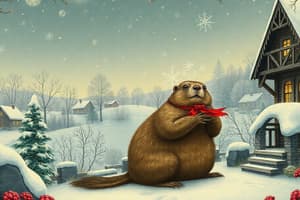Podcast
Questions and Answers
Who was Amerigo Vespucci?
Who was Amerigo Vespucci?
- An Italian explorer who recognized the Americas as different from Asia (correct)
- A Swedish governor of New Sweden
- A King who granted a charter for Pennsylvania
- The founder of the Ephrata Community in Pennsylvania
What is the Second Frame of Government?
What is the Second Frame of Government?
A new constitution made by Penn that gave less power to the governor.
What was New Sweden?
What was New Sweden?
- A Dutch settlement in North America
- A colony governed by a Quaker leader
- A colony settled by Swedish settlers in parts of PA, NJ, and Delaware (correct)
- An English colony established in the 1600s
The Holy Experiment allowed for free ______ and free government in Pennsylvania.
The Holy Experiment allowed for free ______ and free government in Pennsylvania.
Who was Peter Stuyvesant?
Who was Peter Stuyvesant?
Who granted William Penn the Charter for Pennsylvania?
Who granted William Penn the Charter for Pennsylvania?
What does Pennsylvania mean?
What does Pennsylvania mean?
Who was William Penn?
Who was William Penn?
The First Frame of Government established a monarchy in Pennsylvania.
The First Frame of Government established a monarchy in Pennsylvania.
What was the Great Law?
What was the Great Law?
What is a pacifist?
What is a pacifist?
The term 'Quakers' refers to the Society of ______.
The term 'Quakers' refers to the Society of ______.
Who met with William Penn to establish peaceful relations?
Who met with William Penn to establish peaceful relations?
What was the significance of the Charter of Privileges?
What was the significance of the Charter of Privileges?
What were indentured servants?
What were indentured servants?
Flashcards are hidden until you start studying
Study Notes
Key Historical Figures and Concepts
- Amerigo Vespucci: Italian explorer (1454-1521) recognized that the Americas were separate continents from Asia; his name inspired "America."
- Henry Hudson: Explorer who sailed for the Dutch, discovered the Hudson River and navigated the Delaware River while searching for a northwest passage.
- William Penn: Founder of Pennsylvania and a Quaker; established the colony as a "holy experiment" in 1682 promoting religious tolerance and democratic governance.
- Benjamin Franklin: Influential American figure (1706-1790) known for his contributions as a printer, inventor, and diplomat; highly respected in Europe for his work in electricity.
Important Legal Frameworks
- First Frame of Government: Established in 1683, it allowed land-owning men to participate in a representative government, promoting early democracy in America.
- Second Frame of Government: Revised constitution by Penn that reduced the governor's power.
- Charter of Privileges: Penn's third law enabling the colony to present laws to England for approval.
- Great Law: Quaker-based legislation implemented by Penn emphasizing social care and prohibiting work on Sundays.
Colonies and Settlements
- New Sweden: Colony founded by Swedish settlers in 1638 encompassing parts of Pennsylvania, New Jersey, and Delaware.
- Germantown: Founded by German immigrants led by Francis Pastorius, contributing to Pennsylvania’s diversity.
- Ephrata Community: Religious group founded by Conrad Beissel in 1732 in Pennsylvania advocating for communal living.
Native American Relations
- Tamanend: Lenni Lenape chief who established peaceful relations with William Penn and the Pennsylvania colony.
- Peter Stuyvesant: Governor who conquered New Sweden and later lost New Netherland to the English.
Religious Context
- Quakers: Also known as the Society of Friends, followers of George Fox who advocated for pacifism; William Penn provided them a safe haven in Pennsylvania.
- Church of England: The mandated national religion that all people were required to belong to in the 1500s.
- Conversion: The act of changing one’s religious beliefs, significant in the context of early American religious diversity.
Employment and Social Dynamics
- Indentured Servants: Individuals who exchanged labor for passage to America, working without pay for a set number of years.
- Pacifist vs. Defense Quakers: Contrast between those opposed to violence (Pacifists) and those who supported funding for military defense (Defense Quakers).
- Stiffrumps: Quakers who firmly opposed any form of warfare.
Miscellaneous Information
- Philadelphia: Known as the "City of Brotherly Love," founded by William Penn as a refuge for religious liberty.
- Johan Printz: The first governor of New Sweden, viewed as a significant leader before the area fell to English control.
- Hannah Penn: Took over leadership of Pennsylvania following William Penn’s death, contributing to the colony's continuity.
Studying That Suits You
Use AI to generate personalized quizzes and flashcards to suit your learning preferences.



